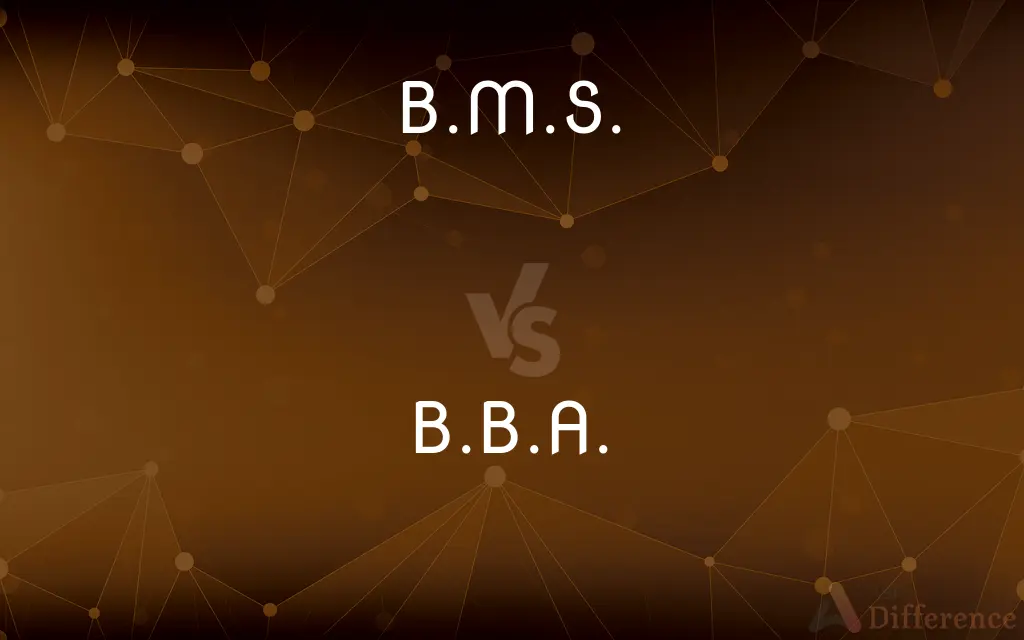B.M.S. vs. B.B.A. — What's the Difference?
By Tayyaba Rehman & Fiza Rafique — Published on February 3, 2024
B.M.S. (Bachelor of Management Studies) focuses on analytical and strategic management skills, while B.B.A. (Bachelor of Business Administration) offers a broader education in business and management principles.

Difference Between B.M.S. and B.B.A.
Table of Contents
ADVERTISEMENT
Key Differences
B.M.S. (Bachelor of Management Studies) emphasizes the development of analytical and strategic thinking skills pertinent to management roles. In contrast, B.B.A. (Bachelor of Business Administration) provides a broader perspective on business operations, covering various aspects such as marketing, finance, and human resources. B.M.S. graduates often pursue specialized managerial roles, while B.B.A. graduates have a wide array of opportunities in different business sectors.
B.M.S. programs often incorporate practical projects and case studies to cultivate problem-solving and decision-making skills tailored for management positions. Meanwhile, B.B.A. programs offer a comprehensive understanding of business practices, combining theoretical knowledge with practical applications in a variety of business functions. B.M.S. is ideal for those aiming for strategic roles, whereas B.B.A. suits individuals seeking a versatile business education.
The curriculum of B.M.S. is designed to be intensive and focused, with subjects directly relating to management and its various facets. On the other hand, B.B.A. covers a wider range of subjects, providing a holistic view of the business world, including electives that allow students to explore various interests. B.M.S. is more specialized, whereas B.B.A. is more generalized.
B.M.S. students are typically prepared for dynamic environments where strategic management is crucial, making them suitable for leadership roles. B.B.A. students, however, gain a solid foundation in business principles, making them adaptable to various roles in the business sector. B.M.S. aligns with those aspiring to be strategic leaders, while B.B.A. is preferable for those looking to explore diverse career paths in business.
The approach to teaching in B.M.S. is often case-study and project-based, focusing on real-world business problems. B.B.A., in contrast, may offer a mix of theoretical instruction and practical projects, ensuring a well-rounded understanding of business operations. B.M.S. graduates are well-equipped for problem-solving in management, whereas B.B.A. graduates are prepared to handle a broad spectrum of business operations.
ADVERTISEMENT
Comparison Chart
Focus
Analytical and strategic management skills.
Broad business and management principles.
Curriculum
Intensive and management-focused.
Wide-ranging with a variety of business subjects.
Teaching Approach
Case studies and practical projects.
Mix of theoretical and practical learning.
Career Path
Specialized managerial roles.
Diverse opportunities in different business sectors.
Ideal For
Aspiring strategic leaders and managers.
Individuals seeking a versatile business education.
Compare with Definitions
B.M.S.
B.M.S. aims to develop leaders equipped with problem-solving and analytical abilities.
His B.M.S. degree equipped him to efficiently resolve the operational challenges in his company.
B.B.A.
B.B.A. graduates are versatile professionals capable of adapting to different business roles.
As a B.B.A. graduate, she quickly adapted to her new role in marketing.
B.M.S.
B.M.S. is a specialized program focusing on strategic management and decision-making skills.
After completing her B.M.S., she immediately got a job as a project manager.
B.B.A.
B.B.A. serves as a foundation for further studies in business, such as an MBA.
After completing her B.B.A., Lisa decided to enhance her qualifications with an MBA.
B.M.S.
B.M.S. offers in-depth knowledge of management theories and their practical applications.
Her B.M.S. background gave her a unique perspective on managing the team.
B.B.A.
B.B.A. emphasizes both theoretical knowledge and practical skills in business operations.
The practical projects during his B.B.A. helped him understand real-world business challenges.
B.M.S.
B.M.S. curriculum is tailored to instill strategic thinking and leadership qualities.
He attributed his success in the strategic planning department to his B.M.S. education.
B.B.A.
B.B.A. provides a comprehensive overview of various business disciplines.
She leveraged her B.B.A. knowledge to excel in multiple departments.
B.M.S.
B.M.S. graduates are known for their expertise in managing complex business operations.
The company's efficiency improved significantly under the guidance of the B.M.S. graduate.
B.B.A.
B.B.A. is designed to offer foundational skills in business management and administration.
His B.B.A. degree laid the groundwork for his successful career in business consulting.
Common Curiosities
Is B.M.S. more theoretical or practical?
B.M.S. typically balances both theoretical and practical aspects of management.
What is the focus of a B.M.S. course?
B.M.S. focuses on analytical and problem-solving skills in management studies.
What are typical career options after B.M.S.?
Graduates often pursue careers in management, consulting, and entrepreneurship.
Are internships important in B.B.A.?
Yes, internships provide practical experience and are a vital part of B.B.A. programs.
What does B.B.A. stand for?
B.B.A. stands for Bachelor of Business Administration.
What's the duration of a B.M.S. course?
B.M.S. courses typically last 3 years.
Can B.M.S. graduates specialize in a specific field of management?
Yes, many B.M.S. programs offer specializations such as marketing, finance, or HR.
What skills does B.B.A. emphasize?
B.B.A. emphasizes leadership, strategic thinking, and business operations skills.
What does B.M.S. stand for?
B.M.S. stands for Bachelor of Management Studies.
Can a B.B.A. lead to an MBA?
Yes, a B.B.A. provides a solid foundation for pursuing an MBA.
Does B.M.S. require a background in commerce?
No, students from various academic backgrounds can pursue a B.M.S.
How is B.B.A. different from B.M.S.?
B.B.A. is more focused on business administration, while B.M.S. emphasizes management studies and decision-making skills.
Is mathematics required for B.B.A.?
Basic mathematics is often part of the B.B.A. curriculum, but advanced math is not usually required.
Can B.B.A. graduates work in government sectors?
Yes, B.B.A. graduates are eligible for various roles in the public sector.
Are projects and presentations a key part of B.M.S.?
Yes, projects and presentations are integral to B.M.S. for practical learning.
Share Your Discovery

Previous Comparison
Facial Mask vs. Facial Pack
Next Comparison
Upper Middle Class vs. Lower Middle ClassAuthor Spotlight
Written by
Tayyaba RehmanTayyaba Rehman is a distinguished writer, currently serving as a primary contributor to askdifference.com. As a researcher in semantics and etymology, Tayyaba's passion for the complexity of languages and their distinctions has found a perfect home on the platform. Tayyaba delves into the intricacies of language, distinguishing between commonly confused words and phrases, thereby providing clarity for readers worldwide.
Co-written by
Fiza RafiqueFiza Rafique is a skilled content writer at AskDifference.com, where she meticulously refines and enhances written pieces. Drawing from her vast editorial expertise, Fiza ensures clarity, accuracy, and precision in every article. Passionate about language, she continually seeks to elevate the quality of content for readers worldwide.













































